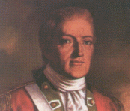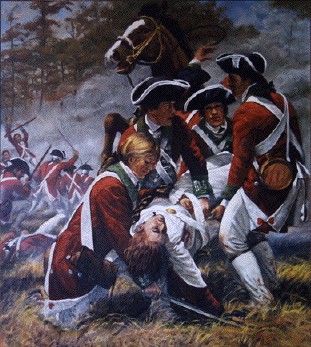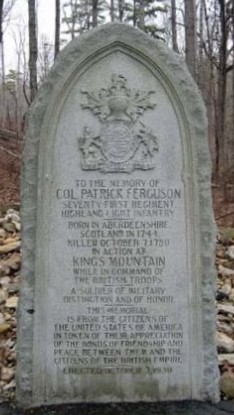The Battle of King's Mountain

Maj. Patrick Ferguson
~~ Inventor of the ~~
Breech Loading Rifle
The real story of this battle is indicative of what the Loyalists were up against, as those that had tried to
help maintain an orderly society, would in defeat be shown little mercy as a means of intimidating like-minded colonists and
deter loyalty to the King.
Since then to disguise this fact most accounts of the battle state the numbers on each side were roughly equal and that the
majority of Loyalist prisoners escaped after, but just as rebel propaganda accused loyalists of what they in fact did
themselves, it is far from the truth:
The background to this battle goes back to 1603 when James VI of Scotland became James I of England & Ireland, who then wanted to secure
his possessions in Ulster (Northern Ireland) so offered Lowland Scots a 100 year lease on land there. When the leases expired the rent
increased, so many particularly those on the border accustomed to warfare emigrated to America. Having little money and fighting in their
blood they settled illegally on Indian land west of the Appalachian mountains. They were known as Ulster Scots and being
mainly Presbyterian believed in their own (by then corrupted) values, meaning they had little respect for other's law, certainly none
from the British Parliment, so were basically lawless and stole from whoever they wanted.
They attacked Indians and Legal homesteaders alike, but it was the Homesteaders that would often suffer the Indian reprisals, the ulster Scots
also attacked British frontier outposts. Major Ferguson after having foiled such an attack sent one of those guilty back
to tell the others that: 'if they did not desist from attacking the area he would march his men over the
mountain to hang their leaders and lay waste their country'. But Ferguson's unit had already forced many rebels out of the area, who having
retreated west of the mountains, agreed with the Ulster Scot to co-operate in fighting a common foe:
On Friday 15th Sept 1780 a small Loyalist detachment were on reconnaissance at the frontier, dangerously out of touch from anywhere conceivably
safe, when they encountered near Quaker Meadows a large number of the most violent people imaginable.
This together with them already knowing about another force of 600 rebels in the area, that had been besieging Col. Browne's garrison
for 5 days before being driven off, they prudently decided to report this back to their recruitment campaign unit. The situation was obviously
ominous, so they decided to all head for Charlotte to join up with another British regiment.
However, evidence suggests these frontier rebels (notorious for stealing other's best horses) were catching up with
them, so when they came to Little Kings Mountain late on the 6th Oct, Major Ferguson, (a Scot of the Seventy-first regiment
who was in
Command and the only non-American in the battle), probably had little choice but to try to defend it with his force of 800
men (115 volunteers and 685 local militia recruits) and took up position along it's crest. But the entire hill being littered
with large boulders and thousands of trees was the very terrain these 'over-the-mountain' outlaws (that made up the majority
of those pursuing him) used so effectively in their incessant ambushing of Indians.
 On Saturday, 7th Oct. at about two o'clock in the afternoon twenty-five hundred rebels, under the command of Brig.-Gen.
Williams, ten Colonels
and at least ten Majors attacked, their numbers enabled them to surround the hill and fire with such
intensity that the Loyalist's eyes were soon full of splinters flying from the trees.
On Saturday, 7th Oct. at about two o'clock in the afternoon twenty-five hundred rebels, under the command of Brig.-Gen.
Williams, ten Colonels
and at least ten Majors attacked, their numbers enabled them to surround the hill and fire with such
intensity that the Loyalist's eyes were soon full of splinters flying from the trees.
With the normal advantage of holding the high ground being negated by ample cover for the rebels to
advance, it was just a matter of time before the Loyalist's ammunition was exhausted. Therefore after about an hour when they
could no longer return fire, they tried to break out with a bayonet charge, but in the effort of rallying his men,
Maj. Ferguson became perilously conspicuous and was hit with a multitude of bullets to the chest.
This left the Loyalists in disarray and so tightly packed together at one end of the hill their position was hopeless,
therefore had tried to surrender, but the killing went on unabated.
When the rebels came across Maj.Ferguson's body they cut it to pieces and urinated on him and this to a man
that one of his Loyalist Lieutenants wrote: - 'A man much attached to his King and country, well informed in the art of war:
that was brave and humane, an agreeable companion; in short, he was universally esteemed in the army, and I have every
reason to regret his unhappy fate' - Lt.A.Allaire.
Both sides lost about 135 men including the Rebel commander, about 664 Loyalist prisoners (90 badly injured) were
taken.
On Thursday, 2nd Nov, Lt. Allaire managed to 'take a walk' (escape) with two others, but before they could do so, he
witnessed the rebels had stuffed their Presbyterian religion with as much republicanism and
propaganda as their camp was full of horse thieves, to justify the mock trials then hangings of
senior officers, their own beatings and denial of any food or shelter from freezing conditions. The only food they in
fact received was from 'Tory' women who at great risk to themselves sneaked it to them.
Those loyalists that tried to escape were nearly all caught and shot, so needless to say very few survived.
His own escape was lucky and only made possible by brave local Loyalist homesteaders who relay shepherded them across to
British lines.
